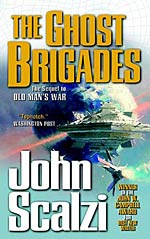
![]() verkisto
verkisto
7/26/2016
![]()
It's not unusual for me to get toward the end of a book and race to reach the conclusion. I've noticed, though, that there are two primary motivations for when I reach that point:
1. The book is a slog, but still interesting, and I'm just ready to be done with it.
2. The book is amazing, and I'm struggling to focus on anything but the story itself.
The Ghost Brigades is the second kind of book. I'm not surprised by that fact (Old Man's War was also one of those kinds of books), but it's good to know that he didn't lose his touch over the course of one book. I was talking to a buddy of mine the other day about the book, and I mentioned that it's one of those addictive books, but that it's hard to pin down exactly why. I can take a guess based on its broader points -- good characterization, an intriguing conflict, and a satisfying conclusion -- but it's harder to determine why those three points succeeded. In a bad book, it's always easy to pinpoint the whys of what makes it bad, but a good book wraps you up so completely that you can't pay close enough attention to work out those whys.
Old Man's War was loosely plotted, choosing instead to focus on the exploits of the latest recruits into the Colonial Defense Force, specifically on John Perry as he rises from recruit to Captain. There's a general thread that runs through the book to give it a premise, but ultimately it follows several different missions instead of focusing on one overarching conflict. The Ghost Brigades follows a more traditional storyline, also focusing on just one character, but this time having one all-encompassing mission to drive the events. Neither book is bad (read the first paragraph again if you don't believe me), but it was interesting to compare them side-by-side.
One thing I thought was clever about the book (and the first one, too, really, though I didn't think about it at the time) is how Scalzi uses nanobots and BrainPals to take care of all the science behind the military technology. Between those two devices, pretty much anything can be done, so it leaves him free to develop the stories and the characters without worrying too much about the details. What details he does give about other technologies seems accurate, enough so for me to wonder if this would be considered "hard sci-fi." I've heard that term bandied about for lighter books like The Martian just because the science is accurate, but I consider hard sci-fi to be something different.
If you've already read Old Man's War, then I don't need to convince you to read this sequel. If you haven't read Old Man's War ... well, what's wrong with you? Get out there and do it! I can pretty much guarantee that if you do, you'll want to read The Ghost Brigades immediately afterward.